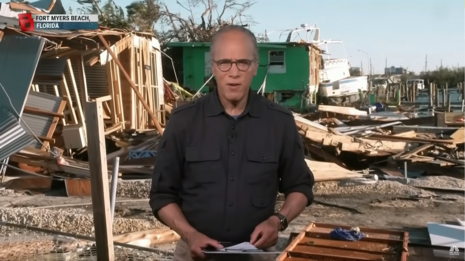The liberal media politicized the deaths of at least 87 people in Florida by blaming the destruction of Hurricane Ian on one their favorite boogeyman — man-made climate change.
 NBC reported that the “number of fatalities in Hurricane Ian’s wake climbed to 87 on Sunday.” The body count may grow in coming days as authorities continue search-and-rescue efforts in Florida, according to NBC’s Oct. 2 story.
NBC reported that the “number of fatalities in Hurricane Ian’s wake climbed to 87 on Sunday.” The body count may grow in coming days as authorities continue search-and-rescue efforts in Florida, according to NBC’s Oct. 2 story.
But that didn’t stop the liberal propaganda mills like Time magazine, NPR, Bloomberg and The Washington Post from taking advantage of the crisis to push climate change hysteria on the American public.
Time magazine published a Sept. 28 story headlined, “Yes, Climate Change Is Making Storms Like Hurricane Ian Worse.” Just one day later, The Post fired off another pseudoscience report headlined, “How climate change is rapidly fueling super hurricanes.”
The armchair scientists at NPR released more climate propaganda that same day, with a story headlined “Climate change makes storms like Ian more common.” Bloomberg News also advanced the climate cause in an Oct. 3 story headlined “Climate Change Infused Hurricane Ian With 10% More Rain, Scientists Say.”
The climate narrative was so ridiculous that Fox News host Tucker Carlson raked the left over the coals for broadcasting images of Hurricane Ian in Florida to score a “cheap and sleazy political point” on the Sept. 29 edition of his show. Carlson proceeded to debunk the left’s claim that hurricanes have dramatically increased in intensity. Carlson cited “models from the NOAA” that indicate “the worst case scenario is that hurricanes get five percent stronger this century.”
Time was the most blatant in advocating the climate change agenda. It directly blasted “the conservative media-sphere” for mocking CNN anchor Don Lemon after he tried to link climate change and weather events like Hurricane Ian. NOAA National Hurricane Center Acting Director Jamie Rhome embarrassed Lemon on live television:
“I don’t think you can link climate change to any one event on the whole,” Rhome told Lemon. “On the cumulative, climate change may be making storms worse, but to link it to any one event, I would caution against that.”
But Time reporter Alejandro de la Garza countered Rhome by playing the role of an expert. He declared that “[t]he science is well-known.” It is worth noting that de la Garza is not a scientist. He is a journalist. But he still repeated propaganda about climate change in an attempt to rebuke “climate deniers,” arguing that Hurricane Ian became 67 percent stronger and the water became warmer than average “largely due to climate change.”
The Post argued that climate change was behind “super hurricanes” like Hurricane Ian in a Sept. 29 climate propaganda piece disguised as a news story. While Floridians continue to reel from Hurricane Ian’s destruction, The Post guessed that climate change “may be” augmenting “‘hurricanes’ potential for intensification — and destruction.” [Emphasis added].
NPR wasn’t shy in spewing its climate bias either, using the chaos and destruction in Florida as more ammunition in the climate change debate. NPR wrote: “Storms like Ian are more likely because of human-caused climate change.”
Bloomberg News rounded out the list with this over-the-top claim: “Climate change made Hurricane Ian’s most extreme rainfall about 10% worse than it would have been without two centuries of greenhouse gas pollution, according to a first-take analysis of the storm by two US climate researchers.”
Bloomberg’s story was reportedly based on a “first-take analysis” by two U.S. climate researchers, but Fox News contributor and scientist Steve Milloy exposed that claim as bunk in exclusive comments to MRC Business. Science reporters often present “[r]aw hypotheses” as facts, Milloy explained, even though the hypotheses haven’t been tested in the real world. He continued:
“This is very common in climate reporting and science reporting more generally. Raw hypotheses are presented as facts with the qualifier ‘scientists say.’ A more accurate qualifier would be ‘scientists make up.’”
Conservatives are under attack. Want to help expose liberal media bias? Contact Time at (letters@time.com), The Washington Post at 202-334-6000, NPR at mediarelations@npr.org and Bloomberg News at letters@bloomberg.net, and demand they stop exploiting a deadly hurricane as a political pivot point to advance an arbitrary climate change agenda.





